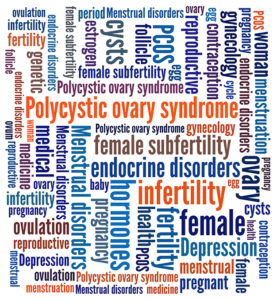 PCOS or Polycystic Ovarian Syndrome, use to be thought of as a sex hormone imbalance; mainly a sign of testosterone dominance. The symptoms were treated with birth control or other hormonal treatments trying to get the ovaries to produce more estrogen and balance progesterone. After realizing these methods were not working, more money was put into research to finally discover that PCOS is due to insulin resistance; a precursor to Type 2 Diabetes. The obvious way to manage and even reverse type 2 diabetes is through changing nutritional habits. So, let’s fix PCOS that way too!
PCOS or Polycystic Ovarian Syndrome, use to be thought of as a sex hormone imbalance; mainly a sign of testosterone dominance. The symptoms were treated with birth control or other hormonal treatments trying to get the ovaries to produce more estrogen and balance progesterone. After realizing these methods were not working, more money was put into research to finally discover that PCOS is due to insulin resistance; a precursor to Type 2 Diabetes. The obvious way to manage and even reverse type 2 diabetes is through changing nutritional habits. So, let’s fix PCOS that way too!
Many women with PCOS experience weight gain or obesity, infrequent periods, infertility and or miscarriage, acne, facial hair, male pattern hair loss, blood sugar issues and fatigue to name a few. This is because insulin stimulates testosterone by the ovaries and inhibits a sex binding hormone of free circulating testosterone; hence why they say PCOS is a testosterone dominant condition. It is also known that genetics can play a role. But just because the genes are there does not mean that they are turned on to show their traits. However, if diabetes, PCOS, or other metabolic conditions run in your family, you will need to take extra care.
Just as obesity, inflammatory and metabolic conditions have increased in Americans, so has PCOS. That is because life choices and foods eaten in the common American diet have more of an impact on blood sugar and hormonal balance than ever before. If you think about all the forms of sugars now sneaking in our foods and beverages as well as the busy, fast-paced lifestyle we now seem to keep we are already setting ourselves up for possibilities of metabolic conditions.
Commonly, one with PCOS, obesity or metabolic issues change their lifestyle and dietary habits. The diet now consists of more whole foods and fiber. They greatly increase their vegetable intake, eliminate or reduce grains, limit fruits, and increase their healthy fat choices. They also add in an exercise routine and a couple of stress reducing tactics to their daily – gentle yoga, meditation, prayer, or breathing exercises. This is a great start! But what happens when this isn’t enough? What if you are already doing these things and not seeing as much change as you thought you would? Adding herbs, certain supplements, and acupuncture should be your next step.
Learn how Acupuncture can effectively treat PCOS
Why these things? Sometimes the body needs extra support. In reversing PCOS, the body needs assistance in detoxification – the liver needs to cleanse the blood of many things, including hormones. The endocrine system, especially the ovaries, adrenals and thyroid are closely working together to remain homeostasis, including hormonal balance. Therefore, supporting these glands with herbs and supplements is very important in treating PCOS.
Ok, so where to begin…
Diet choices to keep in mind:
- Whole, real, fresh foods – nothing out of a box or sitting on the shelf. A Paleo based diet can really help when first making dietary changes. Eventually you will want to add some legumes back in as they are a great source of fiber and inositol, a nutrient that plays a key role in blood sugar balance.
- Not sure how much veggies to eat- shoot for around 1 pound a day. Choose different vegetables on a weekly basis. That should help with meeting your fiber needs as well as getting a wide variety of nutrients.
- Be sure to eat at least three meals a day- and yes, breakfast that includes protein is a must. If more frequent meals are needed at first, that is fine, just be sure they include plenty of vegetables and healthy choices of protein as well as healthy fats.
- Exclude dairy from the diet altogether. You can add some cultured dairy choices back in eventually, but when first making changes, leave it out!
Supplements and herbs to include:
- Cinnamon, turmeric and ginger! They improve insulin resistance- use them on food, in teas, or you can take them in a capsule or powder form.
- Olive leaf extract has been shown in studies to increase the productivity of insulin-producing cells in the pancreas.
- Myo-inositol, about 4 gm a day is used to improve insulin resistance. Use in combination with a food based B-complex supplement.
- Vitamin D- both in a supplement (2,000 iu is fine) and from the sun (fresh air!)
- Chromium picolinate, about 1,000 mcg a day can also improve metabolic conditions.
- Bitter melon has also shown to improve insulin resistance. If you are taking a medication already for insulin resistance such as Metformin, please consult your physician before taking bitter melon.
- Licorice has been shown to reduce testosterone, increase ovulation and improve fertility.
- Certain adaptogens like Ashwagandha, Rhodiola, Ginseng and Maitake mushrooms have been shown to help balance effects of stress, lower cortisol levels, regulate blood sugar levels- all which improve ovulation and hormonal imbalance!
- NAC or n-acetyl cysteine helps in the detoxification process.
- Probiotics- good bacteria will help improve digestion and assimilation of all the good food you are eating, as well as the production of certain vitamins.
These are just a few of the more common things that can certainly improve your health and decrease your symptoms of PCOS. There are more specific herbs and supplements that can be used, however you should consult with your herbalist before beginning them as they may not be appropriate in your specific case. Most women find that best results are reached after 4-6 months of following these food, supplement and herb guidelines as well as better handling their stress. If you would like help treating your PCOS naturally with acupuncture, natural herbs / supplements, and nutritional guidance, give us a call today and schedule a free consultation with one of our skilled acupuncturists at our South Florida office.
 Amy Carlson is a Holistic Nutritionist who practices a whole-foods based approach in helping the body to heal and thrive. She has a strong interest in sharing what she has learned so that everyone has the opportunity to live in a healthy body. “Each body has the ability to heal if it is given what it needs and the understanding of why it is hurting is discovered and nurtured as well.” Learn more about her approach to wellness by visiting her website.
Amy Carlson is a Holistic Nutritionist who practices a whole-foods based approach in helping the body to heal and thrive. She has a strong interest in sharing what she has learned so that everyone has the opportunity to live in a healthy body. “Each body has the ability to heal if it is given what it needs and the understanding of why it is hurting is discovered and nurtured as well.” Learn more about her approach to wellness by visiting her website.
